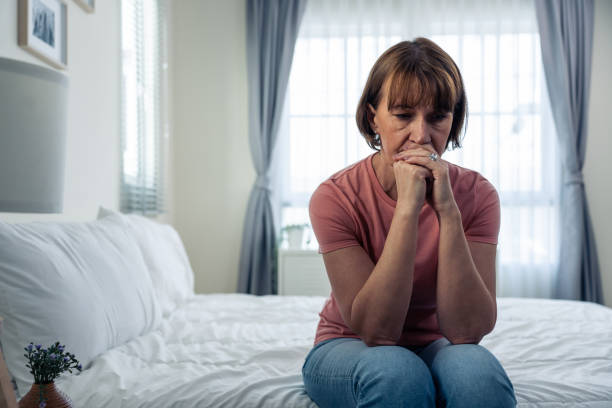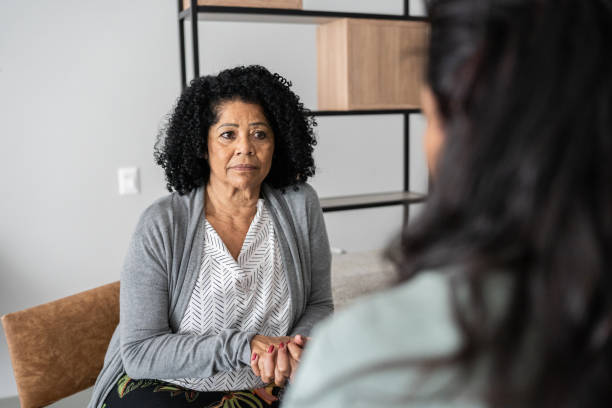
As the sun sets on the tapestry of a life well-lived, older adults often find themselves grappling with a silent adversary: late-life depression. This emotional struggle can cast a shadow on the golden years, affecting mental and physical well-being. Most of us work hard through our adulthood with the promise that we will be able to retire and do all the things we didn’t have time to do: travel, sleep in, relax, take up new hobbies, and spend more time with loved ones. It can be a shock to discover that even if we are in a financial position to retire comfortably, we feel unhappy in our lives.
This stage, which we have been conditioned to look forward to, becomes an immense letdown. We may lose motivation to do the things we once enjoyed or the things we were planning to enjoy. We may discover that we struggle with the challenges of our bodies aging. This is a time of life when more and more friends and contemporaries suffer illness and death; losses seem to come one after the other. No matter what you expected late-life to be, depression can take hold and create pain and frustration.

Late-Life Depression
Late-life depression, also known as geriatric depression, is a mental health condition that affects individuals in their later years. Contrary to common misconceptions, it is not a normal part of aging but rather a complex interplay of biological, psychological, and social factors. The symptoms of late-life depression can vary widely, encompassing persistent feelings of sadness, loss of interest in once-enjoyable activities, changes in appetite and sleep patterns, and a pervasive sense of hopelessness.
3 Ways to Overcome Late-Life Depression
1) Connection Matters:

One potent antidote to late-life depression is fostering social connections. As individuals age, life circumstances may change, leading to reduced social interactions. Combating isolation and loneliness becomes paramount. Engaging in community activities, joining clubs or groups with shared interests, and strengthening family bonds can provide a sense of purpose and connection.
A great way to stay sharp and to feel engaged in life is through communication. We learn and express so much by talking to other people. Keeping our language center firing helps us to feel secure in our ability to connect with others. Often, you will hear of depression causing memory issues and brain fog. In cases where loneliness creeps in, not conversing and using words on a regular basis can contribute to experiencing memory loss, which can contribute to depression, which continues the cycle of forgetfulness, and so on.
Something we hear often from those who attend depression therapy is that they “don’t want to be a bother” and reach out to their loved ones to get together. This is the kind of thinking that can be caused and exacerbated by miscommunication. Often, we hear from parents who don’t get together with their adult children as they might like. Sometimes, this cannot be avoided if there is a long distance between homes. Other times, our patients who are attending therapy for depression realize that they are assuming their children don’t have time for them or that they would reach out if they wanted to. While communication goes both ways, there is still something to say about taking ownership of your desires. You can express your desire for quality time with loved ones without guilt-tripping them or crossing boundaries. This can look like saying, “I really value connecting with you; are there days of the week or times of day when we might be able to get together sometimes?” This invites the other person to consider their schedule and gives them some control over what works for them. Whether you are able to be together in person or whether you make a video call, expressing your desire to communicate with someone, especially a child or grandchild, is your way of seeking what matters.
It’s true that the younger generations in your family may have a tighter schedule than you do. That is why it is so important to have friends of a similar age who are in a similar chapter of life. You may want to get out and go for walks, and you may have a friend who wants the same thing. When you make a point of asking for what you want, you find that you not only have a supporter ready to cheer you on but also that you are helping someone else.
Being in the community allows us not only to receive but also to feel of use through giving. So many of us need a purpose, whether great or small, to carry us through our days. If you are retired, if you are done raising your children, if you can no longer keep up house repairs as you did in the past, you may feel adrift. Though our value as human beings is so much more than our productivity, having a sense of accomplishment is great for morale and self-confidence at all ages.
2) Mindful Wellness Practices:

Integrating mindful wellness practices into daily routines can be a transformative strategy for managing late-life depression. Activities such as meditation, yoga, and deep-breathing exercises not only contribute to physical health but also promote mental well-being. These practices have been shown to reduce stress, anxiety, and depressive symptoms.
Establish a practice that works for your lifestyle, and adjust your schedule as needed so that you are providing yourself with care as your routine evolves. For example, if you find that starting your day off with meditation works best for you, then ensuring time in the morning to do your practice is essential. Trying to keep to a regular sleep schedule will aid in being awake in time to fully enjoy your mindfulness practice without feeling rushed or spread too thin. You may partake in a guided meditation that is seated or lying down, or you may join a yoga class or go for a walk.
You might also find that deep breathing and meditation help you wind down in the evening before bed, and you might want to make time for an evening practice. This can include yoga, meditation, or journaling. Journaling is an excellent tool to help us stay present, as we can vent the things on our minds so that we aren’t ruminating on them any longer and also make a record of our present circumstances. Knowing you are going to write about your day is a great way to train your mind to be observant in the present, which is what mindfulness is!
Through mindfulness, we are able to connect with our wants and needs more easily. When we pay attention to all our cues, we discover how best to put ourselves first. When you listen to your body, what does it tell you? Do you notice hunger, thirst, and a need for rest? Is there pain anywhere; do you know why that is, and do you have a plan to manage it? Do you feel compelled to move your body in a way that feels good for you? If you aren’t able to fall asleep easily at night, you may need to adjust your pre-bed routine to limit electronics and/or burn off any excess energy. You may find that your bedroom is too bright, noisy, or at the wrong temperature. Being mindful means checking in with your senses to determine and mitigate any restrictive factors.
Wellness is greatly bolstered by a regular self-care routine. Self-care will look different for everyone, as will the idea of wellness. Chronic conditions, disabilities, socioeconomic factors, and more make a difference in what your best life looks like for you. It is important for you to strive for what works for you without comparing yourself to others or taking advice from people who aren’t in your shoes. One person’s idea of simplicity can be complicated for someone else, and vice versa. How can you best set yourself up to feel as well as possible for you in your individual situation? At the same time, how can you adjust your idea of “health” to match what your needs truly are?
Checking in with yourself emotionally can help you to navigate your goals. Is there something you want to do that brings you joy, such as putting skills to use for the community, taking a class, or picking up an old hobby? Is there a regular socialization routine that can keep you moving, conversing, learning, expressing yourself, and growing? Are you able to enjoy growing and trying new things without being too hard on yourself? Mindful thoughts are observed without judgment.
3) Professional Support and Therapy:

Seeking professional help is a crucial step in overcoming late-life depression. Mental health professionals specializing in geriatric care can offer tailored interventions and support that make sense for people in the later stage of life. Cognitive-behavioral therapy (CBT) has shown effectiveness in treating late-life depression by addressing negative thought patterns and fostering coping mechanisms.
Through CBT, you can learn what stories you may be telling yourself or what themes are rising to the surface of your consciousness and respond to them differently than you would have in the past. If “the past” was decades ago, this rewriting is especially important; comparing yourself and your coping abilities to when you were much younger and in a different phase of life will only lead to frustration. It is not realistic to expect that your life and biology will change, but your responses will stay the same. CBT helps you address what is happening now and respond in a way that works. For example, you might respond to the thought itself with a reminder that that isn’t beneficial or that you deserve to speak to yourself more kindly than that. In the past, when you might have chosen a coping mechanism that didn’t serve you, such as spending the rest of the day watching television or neglecting to make satisfying meals, you will adopt different behaviors. You might go for a walk, call a friend for a happiness boost, or make your favorite recipe for dinner. Responding to negative emotions by treating yourself with extra care, kindness, and respect goes a long way toward combating negative thoughts and emotions.
If you have never partaken in therapy before, it might feel like a very big step in your life experience. Depending on how you were raised and the attitudes of the people around you, therapy might seem like a very foreign endeavor. You may have been conditioned to believe that therapy wasn’t for strong people; this couldn’t be further from the truth. Therapy is for all people, from all walks of life, in all of life’s stages. Obtaining a safe space in which to reflect on yourself and your needs is a great way to give yourself the utmost care and consideration. Therapists want you to be able to be familiar and comfortable with yourself; they aren’t looking to break you down, but to help bolster who you already are and what you already stand for. You may choose to attend therapy in person; we see patients of all ages for depression therapy here in Woodland Hills. CA online therapy also gives us access to people who are farther away or whose mobility limits them from getting to our office. In-person sessions can sometimes be beneficial because they contain the work in a designated, neutral space. Online sessions can sometimes be beneficial because you can sit in your favorite chair, wear pajamas, or any other comfort behavior. It matters most what feels best for you and allows you to share honestly.
Your depression treatment may include later-life diagnoses of other issues, such as ADHD.
More and more adults are being diagnosed with ADHD and need specialized support for navigating the ways that ADHD and depression coexist. You may also discover that there are biological reasons for your depression, or that exacerbate your depression. Sometimes, medications can go a long way toward helping you to feel better. If that ends up being the case for you, then a doctor can help you determine which medication(s) might be best.

Depression later in life can be treated through conscientious work and care, the same way it can at any age. It is important to find a therapist with whom you feel safe and comfortable and to have an open mind. If you’ve never struggled with depression before, you may find yourself surprised at how all-consuming it can be. You might have to come to terms with your depression through a lot of reflection and acceptance. If you’ve experienced depression in the past and thought it was behind you, your path to feeling better may include anger at the recurrence at a time in life when you thought things would be simpler and easygoing. Outside of your own feelings, you may also worry about the opinions of others; other people are not your concern. They are living their lives, and you are living yours. What matters is doing what is best for you and supporting yourself in every way you possibly can.
Individual Therapy in Woodland Hills, CA
Here at Embracing You Therapy Group, our CBT specialists will work with you to address the underlying reasons behind your mood and anxiety symptoms to give you practical tools to manage emotions more effectively, express your needs more assertively, and overall improve the quality of your day to day life.
Contact us today for your complimentary 20-minute phone consultation with our Client Care Coordinator.




